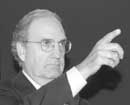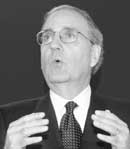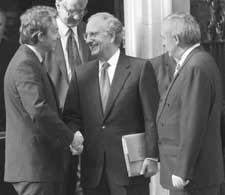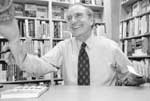By Connie McDougall
![]()


ABOVE: Mitchell speaks at a press conference
in Belfast on September 6, 1999, before beginning talks with the various
political parties in Northern Ireland.
 Former U.S. Senator George Mitchell illustrates the
difficulties of brokering peace in Northern Ireland by telling a story. In
his book, Making Peace, Mitchell writes that strangers would stop him
on the streets of Belfast, almost always saying the same thing. Thanking him
profusely for his assistance in mediating the country's "Troubles," they
added before walking away: "But you're wasting your time."
Former U.S. Senator George Mitchell illustrates the
difficulties of brokering peace in Northern Ireland by telling a story. In
his book, Making Peace, Mitchell writes that strangers would stop him
on the streets of Belfast, almost always saying the same thing. Thanking him
profusely for his assistance in mediating the country's "Troubles," they
added before walking away: "But you're wasting your time."
George Mitchell did the impossible. As chairman of the peace negotiations, he made the 1998 Good Friday Peace Agreement in Northern Ireland a reality, a feat that has been recognized by his nomination for the 2000 Nobel Peace Prize. Although the agreement has been threatened recently over the issue of weapons decommissioning, it is far from collapse and Mitchell thinks peace, eventually, will endure.
"Conflict is not inevitable," says Mitchell. "I believe leadership is critical, but much of what passes for politics today is an effort to divide people and gain political advantage. It's not surprising then when people react the way they do. Intelligent, thoughtful leadership seeks to unite."
That's a viewpoint shared by Seattle Pacific University President Philip Eaton, who has been working to encourage strong moral leadership in the local community. "Teaching competence and character is what we are all about at SPU. George Mitchell is someone who exhibits both qualities. He is a master at bringing together people of diverse points of view and finding a solution to conflict. We desperately need leaders like Mitchell, leaders who bring the hope that comes with unity."
When he spoke at SPU's annual Greater Seattle Community Breakfast on May 3, Mitchell joined a select group of leaders -- including Pulitzer Prize-winning columnist George Will and international journalist David Aikman -- who have used the forum to challenge business and community leaders with provocative ideas. Nearly 900 people attended this year's event.
Mitchell addressed the group on issues of international trade, particularly on the role of the World Trade Organization. To be successful, he notes, the WTO must contribute to economic equity in the world. That's an incredibly difficult task considering the enormity of the problem, but Mitchell is not deterred by difficulty.
Certainly chairing the Northern Ireland peace negotiations was tough, and serving 15 years in the U.S. Senate, finally as majority leader, posed its own challenges. Mitchell explains his determination this way: "It's simple. I have a desire to be of help when I can be."
Mitchell is fortified by a rugged optimism, likely developed in his childhood, which was not at all privileged. His mother was from Lebanon and his father the son of Irish immigrants, a heritage that shaped Mitchell's religious beliefs. "I am a man of faith. A Catholic. It's helped me through some very hard times."
Education is another value he holds dear. His parents, unschooled themselves, saw every one of their children graduate from college. "My father felt that with a good education, you could do anything." Mitchell feels much the same way and instituted a scholarship program in his home state of Maine. "This year we awarded 160 students, one from every high school in Maine, a $4,000 scholarship," he says, adding, "I was in need once and people helped me."
Mitchell considers the scholarship fund one of his most important accomplishments. The other is Irish peace. "The Lord works in mysterious ways, and my work in the Senate prepared me for the peace talks," he laughs. "I told the Irish, �I'm used to listening to senators so I can listen to you.'"
He found that the ability to listen was a great advantage in the talks. "We don't often truly listen to each other. It takes concentration," Mitchell says. "I also tried to encourage them to see each other as I saw them: as fellow human beings with the same aspirations."
Mitchell's diplomacy has been used in other ways at home. He became chair of the Ethics Committee of the U.S. Olympic Committee after scandal rocked that organization in recent years. He also sits on a blue-ribbon panel studying the economics of baseball, with a report of their recommendations due out this month. It's Mitchell's hope that their findings will enhance competition in a game sullied by money, power and egos.
With his towering achievements here and abroad, the former senator may well be consulted more often to resolve disputes, and he doesn't preclude a future like that of elder statesman Jimmy Carter. Ireland, however, won't be part of it. "I do not wish to go back as chairman," he admits. "It's not healthy in a democratic society to have a permanent outside arbiter. They have to do it themselves, and who are we to tell them otherwise? The problem in Ireland really is the consequence of failed leadership."
This applies as much to individuals as it does to nations, he says. "Each of us is made up of high ideals and base instincts," Mitchell believes. "A leader has to experience what's possible and appeal to the best in us."
He points to South Africa as an example of what thoughtful leadership can do. While Mitchell is cautious to draw too many parallels between Northern Ireland and South Africa, he believes the leadership of Nelson Mandela is what pulled that nation back from the brink. "Mandela is a great man," says Mitchell, "particularly in his capacity to forgive and not to be bound to the past."
When the former senator turns his attention to his own country, he sees its problems but is not overwhelmed by them. In fact, he believes, many of our current dilemmas can begin to be solved at home. He points to his own life with his wife, Heather, and their toddler, Andrew. The Mitchells do not allow Andrew to watch TV. "If I'm watching a sporting event or the news and he comes in, usually I'll turn it off," says Mitchell. "I believe the necessity to establish values rests with the parents. It's not easy, with poverty or prosperity, sex, violence, drugs -- all the problems that have been so well-documented. But it's the parents' job."
In spite of the threats to family, country and international well-being, dangers with which Mitchell is intimately familiar, he is a man of unshakeable resolve. "I don't lose my optimism. I think we are moving forward and that progress is inevitable."
| Making Peace In the beginning of Making Peace, his book on the Northern Ireland peace negotiations, former U.S. Senator George Mitchell opens with a poem written by a 14-year-old Irish girl. The poem speaks about her fear and sorrow, and the violence she's witnessed. It ends with these words: "I have never known peace."
The book is meant to educate. "I think most Americans have a good feeling toward Ireland, but they don't have much understanding of the conflict there. I'm not a historian, but I could give my personal account of the same information." He does so in a book that gives readers a behind-the-scenes look at the negotiations that took more than two years of Mitchell's life. The wrenching difficulties of bringing together warring groups are often unexpectedly funny. "Even when I got them together they wouldn't speak to each other," he recalls. He describes how "silly" he felt when one Irish politician would tell him to say something to another leader who sat just one chair away.
Exhausted, elated, Mitchell left Ireland in 1998, convinced that peace could endure, in part because the people want it so much. |
![]()

| Please
read our
disclaimer.
Send any questions, comments or correspondence about Response to
jgilnett@spu.edu or call 206-281-2051. Copyright © 2000 University Communications, Seattle Pacific University.
Seattle Pacific University |
 This sort of grinding, chronic war is
extraordinarily difficult for the average American to comprehend, says Mitchell.
To that end,
he decided to chronicle his
historic role in bringing about the 1998 Northern Ireland Peace Agreement.
This sort of grinding, chronic war is
extraordinarily difficult for the average American to comprehend, says Mitchell.
To that end,
he decided to chronicle his
historic role in bringing about the 1998 Northern Ireland Peace Agreement.
 The book also offers insight into the people behind the headlines, the main players in the Irish Troubles: the fiery orator Ian Paisley, who represents unionists, and Sinn Fein's Gerry Adams.
The book also offers insight into the people behind the headlines, the main players in the Irish Troubles: the fiery orator Ian Paisley, who represents unionists, and Sinn Fein's Gerry Adams.